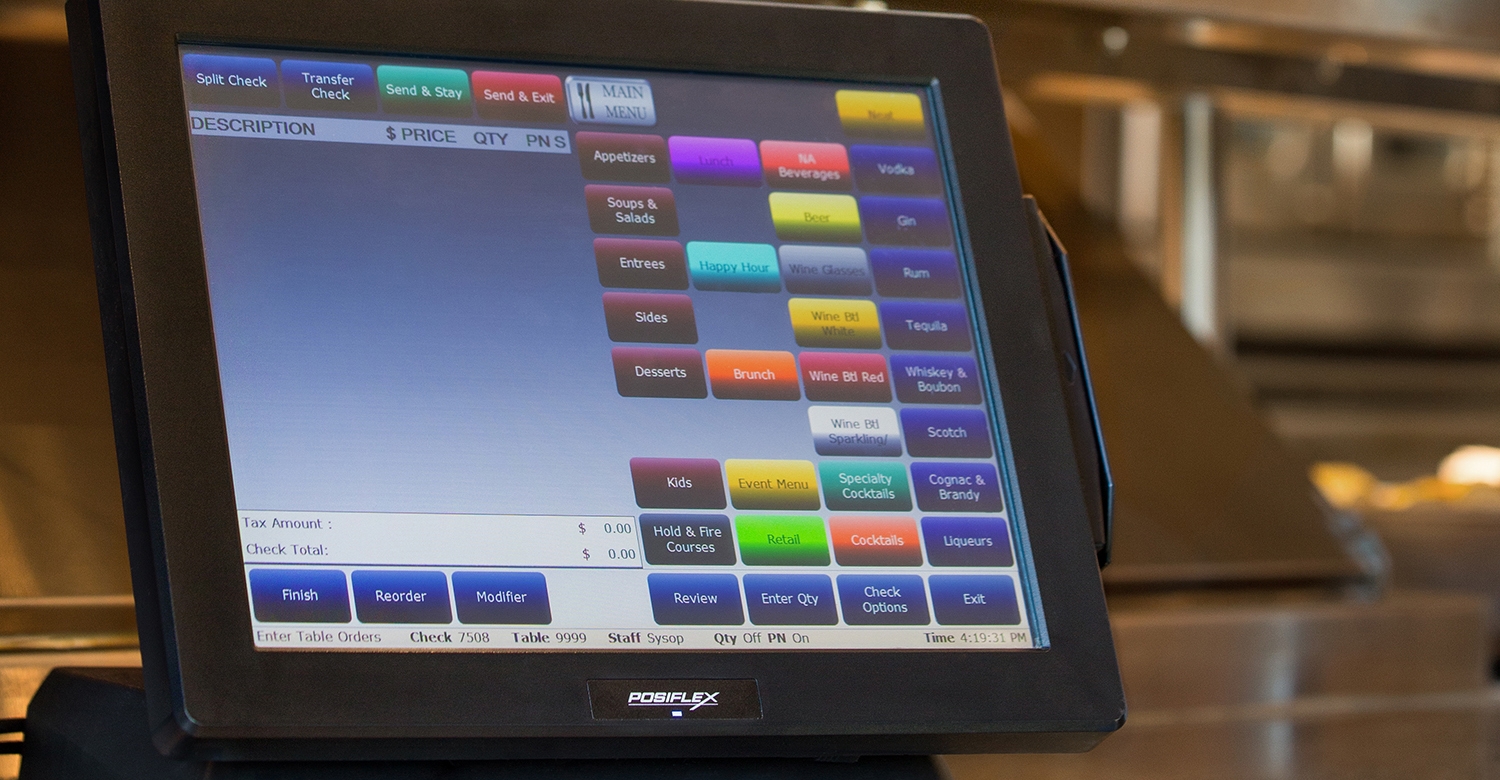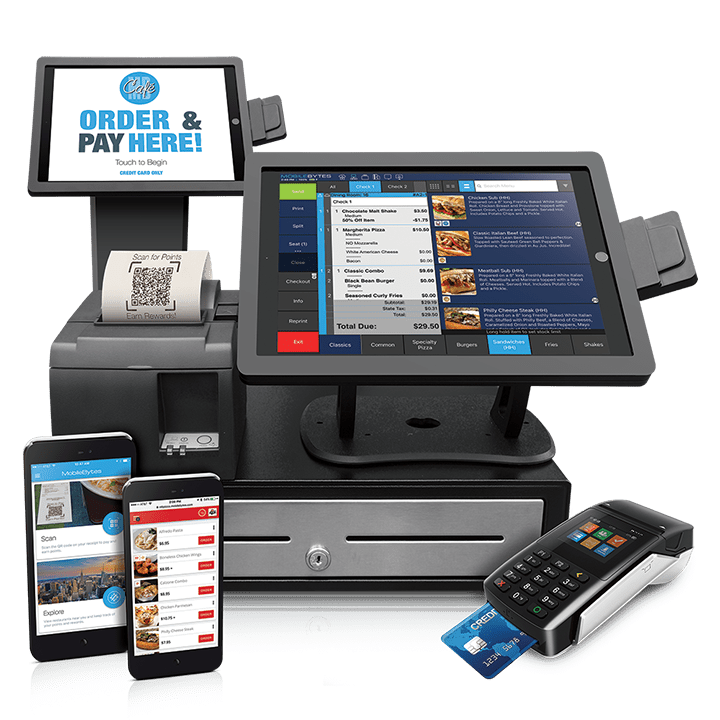The Greatest Guide To Clover Pos
The Greatest Guide To Clover Pos
Blog Article
See This Report about Pos Machine

Point of Sale: Retail Point-Of-Sale Solutions Streamline Deals
The Buzz on Pos Machine

Hardware Components of a Point of Sale System What makes a POS system tick? It's not simply software; the hardware plays a starring role. Think of it as the body to the software application's brain. Without the right hardware, even the most sophisticated POS software is just a quite face. Necessary POS Hardware So, what are the must-haves? Let's simplify. The central processing unit, typically a computer system or tablet, is the heart of the operation. The display or touchscreen show allows staff to interact with the system. A barcode scanner accelerate the checkout procedure. Keep in mind the days of manually getting in each code? The dependable receipt printer offers customers with a record of their purchase. A cash drawer keeps your cash safe and organized. A card reader permits clients to pay with credit or debit cards. Diving Deeper: Beyond the Fundamentals But wait, there's more! Depending upon your service, you may need customized hardware. A restaurant might include kitchen area printers to relay orders, while a retail shop might utilize label printers for product tagging. Ever question how your local bakeshop instantly prints those delicious-looking labels? Choosing the Right Hardware: A Balancing Act Selecting the right hardware isn't practically buying the most costly devices. It has to do with discovering the sweet spot between functionality, durability, and budget plan. A small company simply starting out may go with a more standard setup, while a high-volume seller will require robust, high-performance devices. Is it better to buy new or used? Consider your alternatives thoroughly. A new system provides the current innovation and warranty defense, however a reconditioned system can conserve you cash. The Future of POS Hardware What does the future hold? Anticipate to see a lot more combination with mobile phones, biometric scanners for worker authentication, and advanced analytics control panels displayed on larger, clearer screens. Think of a world where stock is immediately upgraded in real-time as products are scanned-- a world where you can track your best-selling product from throughout the world. The possibilities are limitless, and the hardware is continually evolving to meet the needs these days's services. Are you prepared to update your point of more info sale system?
Software Application Characteristics and Capabilities: The Heart of Your POS System
Ever watch a skilled barista move through a hectic early morning rush? Their trick isn't simply caffeine; it's a smooth dance with their POS system. The software is the conductor of your service symphony, managing everything from sales to inventory. But what notes should you be listening for? What capabilities truly matter in today's market?
Stock Management: Beyond Counting Beans
Forget spreadsheets that haunt your dreams. Modern POS systems use real-time stock tracking, signaling you when your stock of artisanal coffee beans dips precariously low. Think about it as a digital guardian angel, avoiding those awkward "Sorry, we're out!" minutes to consumers. What if you could also anticipate need based on historic information? Many systems now offer forecasting tools, an effective weapon versus overstocking and lost sales. This assists prevent the predicament of running out of popular items or accumulating excess stock of slow-moving items, both of which can constrain capital and space.
Sales Reporting and Analytics: Deciphering the Data
Sales information is the new gold, and your POS system is the miner. Forget just understanding just how much you sold today. Dive deep into the information to discover trends, recognize your best-selling items, and understand customer habits. Which menu product pairs perfectly with the daily special? Which promo resonated most with your clientele? These insights are not just intriguing; they're actionable intelligence. Without trustworthy sales reporting, browsing the intricacies of organization decision-making ends up being like cruising without a compass, increasing the chance of errors and missed opportunities.
Consumer Relationship Management (CRM): Building Bridges, Not Walls
Keeping in mind a regular client's name and preferred order is captivating, however scaling that individual touch is difficult. POS systems with CRM capabilities allow you to track consumer purchase history, choices, and even birthdays. Imagine instantly providing a discount rate on their birthday-- a little gesture that promotes commitment and motivates repeat organization. But there is the prospective snag of bad data quality, which can result in incorrect client profiles and inadequate marketing efforts.
Payment Processing: Streamlining the Transaction
The checkout experience can make or break a sale. Smooth combination with various payment techniques-- charge card, mobile wallets, even copyright-- is non-negotiable. Can your system handle split payments? Does it provide safe and secure tokenization to safeguard customer data? A clunky payment procedure resembles striking a sour note in your business symphony, possibly interrupting the entire performance. Guaranteeing compatibility with evolving payment technologies and adherence to security requirements are vital for maintaining consumer trust and functional performance.
Employee Management: Keeping the Team in Sync
From clocking in and out to handling authorizations and tracking efficiency, employee management includes streamline operations and enhance responsibility. Is scheduling a headache? Numerous POS systems use integrated scheduling tools, optimizing staffing levels based upon anticipated demand. A common obstacle that is often neglected is the difficulty of incorporating staff member management functionalities with payroll systems, which can result in errors and inadequacies in wage estimations.
Advanced Features: Leveling Up Your Operations
- Table Management: Suitable for dining establishments, this feature enables you to picture your dining-room, track table status, and manage bookings.
- Commitment Programs: Reward your finest clients and encourage repeat organization with integrated commitment programs.
- Online Buying Integration: Perfectly incorporate your POS system with online buying platforms to expand your reach.
Choosing the ideal POS system is about more than just performance; it has to do with discovering a partner that can grow with your organization. Consider your existing requirements, prepare for future development, and don't be scared to ask the tough questions. The right software can transform your organization from a chaotic cacophony into a harmonious masterpiece.
Industry-Specific POS System Applications
Believe of the regional bakeshop, busy with early morning consumers yearning fresh croissants. A generic POS system might manage deals, however can it handle intricate recipes, track ingredient stock, or instantly adjust production schedules based upon sales data? Most likely not. That is where the beauty of industry-specific POS systems shines.
Restaurants and Hospitality
For busy dining establishments, speed and precision are paramount. The number of times have you seen servers juggling orders, modifications, and splitting expenses, all while attempting to provide exceptional service? A restaurant POS system improves these processes, enabling table management, kitchen order tickets, and even online purchasing combination. These systems frequently consist of functions like ingredient-level stock tracking, vital for managing food costs and lessening waste. Ever question why your preferred dish is in some cases unavailable? It might come from an absence of appropriate stock management.
- Table Management
- Kitchen Order Tickets
- Online Purchasing Combination
- Ingredient-Level Inventory Tracking
Retail Solutions
Retail, with its varied stock and client interactions, demands a various set of tools. Picture a boutique clothes shop having a hard time to track sizes, colors, and seasonal collections using a basic checkout system. An industry-specific retail POS system offers functions like barcode scanning, customer commitment programs, and comprehensive sales reporting. These systems can even integrate with e-commerce platforms, offering a smooth omnichannel experience for clients. Did you understand some retail POS systems can anticipate future sales trends based on historic information? Now that is powerful!
The Hazards of a Mismatch
Choosing the wrong POS system can produce significant operational obstacles. A clothing store utilizing a restaurant POS, for example, would discover it unsuitable for handling inventory with sizes and colors. The absence of proper reporting and analytics could cause mistaken buying choices and lost revenue. The result could be similar to trying to fit a square peg in a round hole.
Key Considerations
Choosing an industry-specific POS system requires cautious evaluation. Think about your company's distinct needs and operational workflows. Does the system integrate with existing software application? Does it offer the essential reporting abilities? Is it scalable to accommodate future growth? A well-chosen POS system is not simply a deal tool; it's a tactical possession that can drive performance, improve customer fulfillment, and ultimately, improve your bottom line. Remember, it is a financial investment in your organization's future, not just a cost.
Security Factors To Consider for Point of Sale Systems
Ever heard the tale of the mom-and-pop shop that lost whatever due to the fact that of a single, ignored security defect in their POS system!.?. !? It's a cautionary tale, and it highlights an important aspect frequently eclipsed by the allure of fancy features and structured operations. The truth is, a POS system is only as good as its security. What good is a system that crunches numbers in a flash if it enables lawbreakers to swipe consumer's information simply as quickly?
The Vulnerability Minefield
The digital landscape is a battlefield. Every POS system, no matter size or elegance, is a prospective target. Are you genuinely got ready for the hazards lurking around the corner? The genuine pinch comes when you find that your outdated software application has a gaping hole that hackers can exploit, turning your service into an unwitting accomplice in identity theft. The difficulty is that hackers are crafty and are constantly changing their strategies.
Common Security Spaces and Expert Tips
- Weak Passwords: "Password123" isn't sufficing. Usage strong, distinct passwords for all POS system accounts and alter them routinely. Two-factor authentication is a must.
- Unsecured Networks: Your Wi-Fi resembles leaving the front door open. Protect your network with strong file encryption (WPA3 if possible) and consider a separate network for your POS system.
- Out-of-date Software Application: Software suppliers patch security holes all the time. Failing to update is like welcoming trouble. Set up automatic updates or schedule regular maintenance.
- Employee Training: Your personnel is your first line of defense. Train them to recognize phishing efforts, safeguard passwords, and report suspicious activity.
Data Encryption: Your Guard Against the Dark Arts
Think about data file encryption as a secret code. It scrambles delicate info, like credit card numbers, making it unreadable to unauthorized users. Without encryption, your clients' financial details are like sitting ducks, ripe for the picking by cybercriminals. It's not simply about protecting your clients; it has to do with safeguarding your track record and avoiding significant fines.
PCI Compliance: The Rulebook You Can't Disregard
If you accept charge card, you're bound by the Payment Card Market Data Security Requirement (PCI DSS) It's a set of security requirements designed to secure cardholder information. Stopping working to comply can lead to fines, penalties, and even the loss of your ability to process charge card payments. It's a headache, yes, however it's an essential one. Consider PCI compliance as the cost of doing business in the digital age.
Consider this: every transaction processed through your point of sale is a possible entry point for malicious actors. By implementing robust security measures, you're not just securing your business; you're safeguarding your clients' trust and making sure the long-lasting practicality of your operations. The security of your POS system isn't just a technical problem; it's an organization vital. It needs consistent vigilance, proactive procedures, and a dedication to staying ahead of the curve.